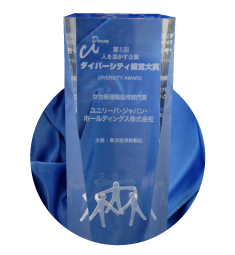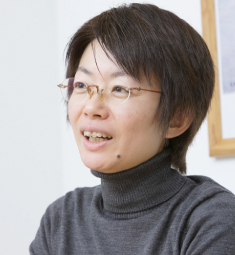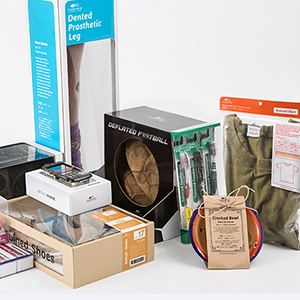
The Toyo Keizai Gender Diversity Prize
Recognised for a workplace that nurtures female managers
- Female directors and managers number over three times Japan average
- Work at home, mentoring, counselling, networking for working mothers
- Employs and promotes only on qualifications and ability
Unilever Japan has been recognised for its exceptional commitment to gender diversity by one of the most influential business publishers in Japan.
Toyo Keizai presents the Gender Diversity Prize each year to a firm that contributes to its corporate social responsibilities in terms of human resources and employment through initiatives to promote female managers in the organisation.
Unilever collected the prize this year for its global gender diversity initiatives to create a workplace in which female managers are able to feel respected and give their best in terms of performance and for its contribution by leading diversity management in Japan.

Yuko Miyata: Unilever is committed to diversity at work.
“Over the years, we have been embracing diversity based on our Code of Business Principles and global personnel evaluation system. For Unilever, diversity is not an ethical right or moral obligation. It is a key to better serve our consumers, attract and develop the best talent and, ultimately, achieve our ambitions to double the size of business while reducing environmental impact”.
As part of its growth strategy, Miyata said the firm aims to further improve gender balancing at management level.
“Almost 80% of our consumers worldwide are women. We need to better reflect internally the consumers we represent externally”, Miyata explained.
Unilever’s global target is, by 2015, to raise the proportion of females in management to 25% of the presidents of its firms, 35% of the boards, and 50% of its directors and managers. The target in Japan is to increase the number of female directors and managers to 40% over the same period.
Unilever said in a statement: “Because our Code of Business Principles states that we should recruit, employ and promote employees on the sole basis of the qualifications and abilities needed for the work to be performed, we do not operate affirmative action. Instead, we have developed innovative programmes to support our employees in their career development and progression”.
The programmes include flexible working practices, mentoring, networking and developing an inclusive working environment. Recent initiatives in Japan include the introduction of a work-at-home system, counselling, mentoring programmes for female manager and director candidates, and internal networking for working mothers.
According to Miyata, as a result of long-term commitment and new initiatives to attain greater diversity, 27% of the firm’s directors and managers in Japan are women—well ahead of the 8% national average reported in the Basic Report of Equal Employment 2010 published by Japan’s Ministry of Health, Labour and Welfare.
“To further promote diversity, we would need to work with governments, other businesses and groups to allow more flexibility and a better work-life balance in society. We call on others to join us on the journey”, Miyata added.
Established in 1895, Toyo Keizai publishes books and magazines on business, politics and economics. The Toyo Keizai Diversity Management Award recognises firms that embed diversity management in their corporate vision and take a progressive approach. The Gender Diversity Prize is given to a firm that has a distinctive vision, excellent programmes and a tangible implementation policy.
Unilever, with more than 171,000 staff in 190 countries, last year generated sales of €46.5bn with products such as Dove, Lux, Pond’s, Lipton and AXE.





